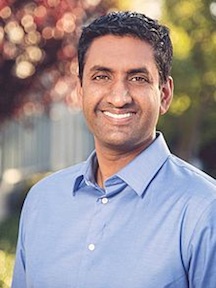By Connor Collins
On November 8, Ro Khanna (ΦBK, University of Chicago, 1998) defeated incumbent Congressman Mike Honda in California’s 17th District for the US House of Representatives by a margin of 39,224 votes, or 21% of the districtwide votes. Khanna ran on a platform of change against Honda who held his district’s seat for the past 16 years. California’s 17th District overlaps heavily with Silicon Valley, and the focus on Silicon Valley tropes showed. The New Yorker dubbed Khanna “The Disruption Candidate,” comparing Khanna’s campaign to the prototypical Silicon Valley start-up: bright-eyed and eager to challenge the existing order. Khanna’s own website notes that he wants to “move beyond the gridlock in Washington.” He now has the chance.
Although the change-versus-status-quo format of this contest mirrored many other congressional contests and the general election this year, it was relatively absent from national news coverage because Khanna and Honda are both Democrats. Nevertheless, Khanna’s bid for the 17th District’s congressional seat demonstrates some important lessons. It demonstrates the power of the people to elect representatives who they think will best serve their interests. Khanna addressed his supporters and constituents at the Royal Palace Banquet Hall Tuesday evening after the incoming votes had swung in his favor: “I know it’s a deeply divided national election, and it’s easy to become cynical these days, but let us remember our democracy is the most open political system in the world.” Public discourse and the freedom of thought to exercise one’s vote played their roles in Khanna’s victory. His words highlight another lesson.
In 2014 Khanna lost the primary to Honda by 20 points, according to the Los Angeles Times. He narrowed that gap to three points by the November election but still came up short; Khanna had lost and Honda had retained his seat fair and square. Rather than being discouraged in the face of a tough loss, Khanna used it as a learning experience. He decided to try again this year, and he succeeded, which brings us to the second lesson. One of the many benefits of democracy is the cyclical nature of elections. When Khanna failed in 2014, he was surely disappointed, but he knew he would get another chance to run. He waited two years, reevaluating his strategy, wooing potential voters and donors, and preparing for the next election. “Losing forces you to look at where you were weak and where you could have done better,” Khanna told the San Francisco Chronicle in May. To recognize that next time, during the next election, someone who failed in the past or some group dissatisfied with the current landscape can enact change ensures the continuation of democracy and the peaceful transition of power.
Khanna’s experience embodies the democratic process. Drawing upon his undergraduate education in economics at the University of Chicago, his law degree from Yale University, and his political activism—ranging from a stint with President Obama’s state senate bid in Illinois during Khanna’s college years to a 2003 protest campaign for a California congressional seat—Khanna has shown his commitment to bettering himself and his community. His active participation in the political process as an engaged citizen and leader serves as a reminder of this country’s and Phi Beta Kappa’s ideals.
Connor Collins is a senior at Case Western Reserve University double majoring in political science and sociology. Case Western Reserve University is home to the Alpha of Ohio Chapter of Phi Beta Kappa.




